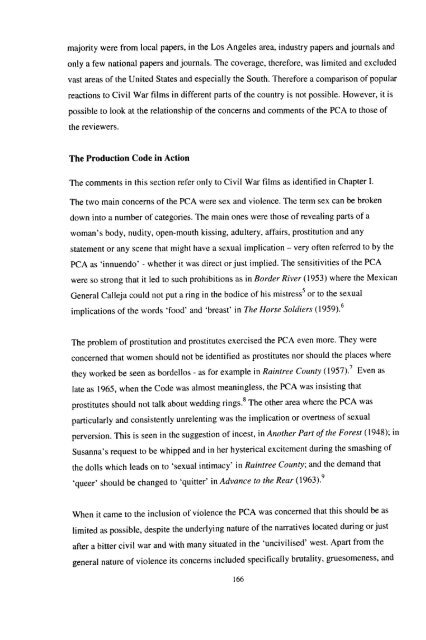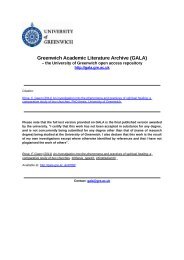Download (3483kB) - Greenwich Academic Literature Archive ...
Download (3483kB) - Greenwich Academic Literature Archive ...
Download (3483kB) - Greenwich Academic Literature Archive ...
- No tags were found...
You also want an ePaper? Increase the reach of your titles
YUMPU automatically turns print PDFs into web optimized ePapers that Google loves.
majority were from local papers, in the Los Angeles area, industry papers and journals andonly a few national papers and journals. The coverage, therefore, was limited and excludedvast areas of the United States and especially the South. Therefore a comparison of popularreactions to Civil War films in different parts of the country is not possible. However, it ispossible to look at the relationship of the concerns and comments of the PCA to those ofthe reviewers.The comments in this section refer only to Civil War films as identified in Chapter I.The two main concerns of the PCA were sex and violence. The term sex can be brokendown into a number of categories. The main ones were those of revealing parts of awoman's body, nudity, open-mouth kissing, adultery, affairs, prostitution and anystatement or any scene that might have a sexual implication - very often referred to by thePCA as 'innuendo' - whether it was direct or just implied. The sensitivities of the PCAwere so strong that it led to such prohibitions as in Border River (1953) where the MexicanGeneral Calleja could not put a ring in the bodice of his mistress5 or to the sexualimplications of the words 'food' and 'breast' in The Horse Soldiers (1959). 6The problem of prostitution and prostitutes exercised the PCA even more. They wereconcerned that women should not be identified as prostitutes nor should the places wherethey worked be seen as bordellos - as for example in Raintree County (1957). 7 Even aslate as 1965, when the Code was almost meaningless, the PCA was insisting thatprostitutes should not talk about wedding rings. 8 The other area where the PCA wasparticularly and consistently unrelenting was the implication or overtness of sexualperversion. This is seen in the suggestion of incest, in Another Part of the Forest (1948); inSusanna's request to be whipped and in her hysterical excitement during the smashing ofthe dolls which leads on to 'sexual intimacy' in Raintree County; and the demand that'queer' should be changed to 'quitter' in Advance to the Rear (1963).When it came to the inclusion of violence the PCA was concerned that this should be aslimited as possible, despite the underlying nature of the narratives located during or justafter a bitter civil war and with many situated in the 'uncivilised' west. Apart from thegeneral nature of violence its concerns included specifically brutality, gruesomeness, and166
















